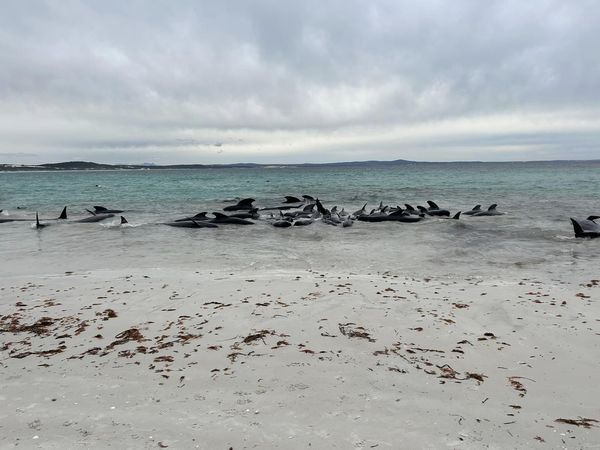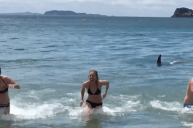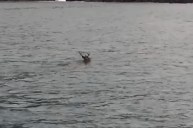A pod of nearly 100 pilot whales died earlier this week after becoming stranded on a Western Australia beach. Everything started Tuesday when 96 long-finned pilot whales were seen huddling together in a tight group about 325 feet offshore.
Not long after, the pod washed ashore, for reasons that still aren't known.
Sadly, half of the whales died within hours of being stranded on the beach, CBS News reported.
By Thursday, more than 40 of the original pod were still alive. A team of workers from the Parks and Wildlife Service of Western Australia and hundreds of volunteers worked to save the aquatic animals. Rescuers devised a scheme that involved keeping the whales submerged while relocating them back out to sea.
Unfortunately, within 45 minutes of this near-successful attempt, the whales had again returned ashore to the shallows, indicating that their chances of survival in deeper waters were slim, said the Western Australia Parks and Wildlife Service.
After two days of intense efforts, the decision was made to euthanize the remaining pilot whales.
"Within an hour of beaching, veterinarians had assessed the whales and confirmed they were displaying signs of rapid deterioration," the PWS agency said. "Our incident management team then determined the most appropriate and humane course of action was to euthanize the 43 remaining whales to avoid prolonging their suffering."
Rescuer Mike Conway spent more than nine hours in the water during the ultimately unsuccessful pilot whale rescue attempt. "We had both an exhilarating and heartbreaking day ... doing all we could to keep the remaining 45 whales calm and upright so they had the best possible chance of a safe release," he wrote in a Facebook post. "When we were given the go-ahead to attempt release, we swum them out deeper, gave our whales one final rub, wished them luck and pushed them in the direction of the open ocean."
He continued: "We remained in the water, slapping the surface, gently turning a snubby nose around here and there as they turned back the wrong way. But we never gave up! We remained hopeful, but it became evident pretty quickly, they were intent on heading back to the shallows...We then spent several more hours carrying each precious whale out of the water in a sling to be checked over by the vets, but the poor things were not doing too good by this stage and the heartbreaking, but correct, decision was made to end their suffering."
This isn't the first instance of pilot whales beaching themselves in large numbers. Last year, approximately 500 pilot whales died after becoming stranded on a remote island in the South Pacific.
The phenomenon, while unfortunate, seems to be a natural occurrence. One stretch of beach in New Zealand is notorious for its frequent whale strandings, where it has occurred multiple times throughout the past 15 years. The worst incident there happened in February 2017, when almost 700 whales beached, resulting in 250 deaths.
READ MORE: 10,000+ Fish Have Washed Up Dead in Texas and the UK—Why?




